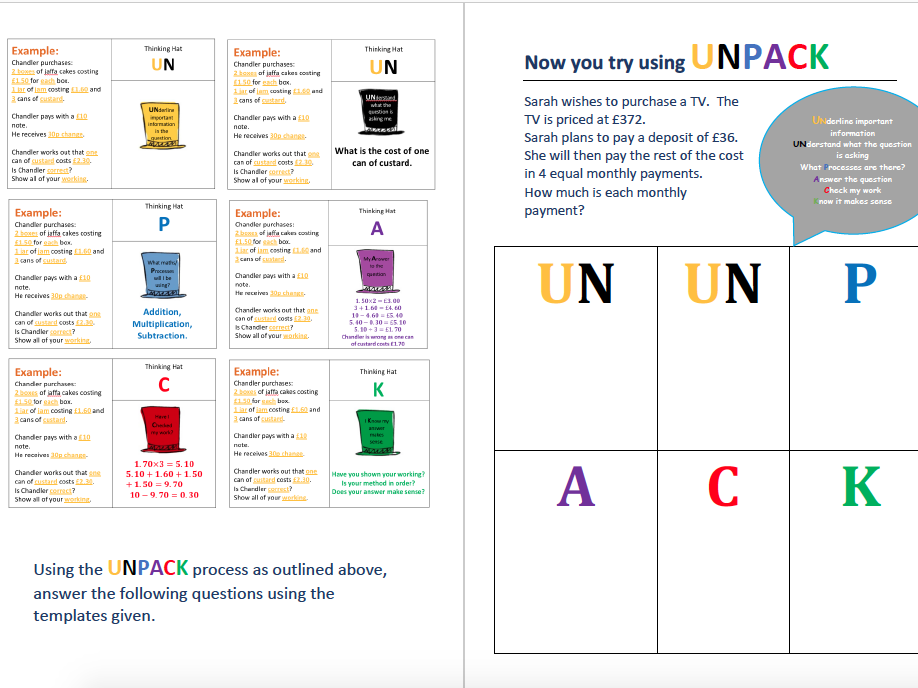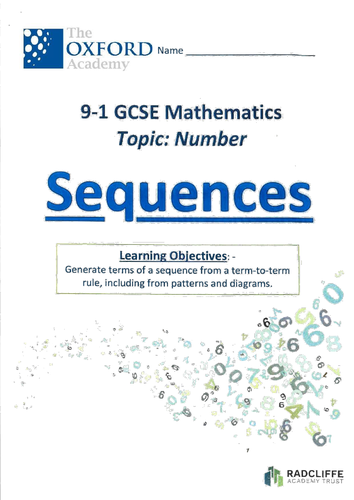
73Uploads
12k+Views
3k+Downloads
Math
Sale

UNPACK Maths Problems
I am going to UNPACK these Maths Problems!
To effectively solve problems in mathematics, and for you to get all of the ‘P’ marks in the exam, you will need to UNPACK the questions. This work booklet shows students how to ensure that they get the full marks when tackling problems solving questions in the exam.
By following the UNPACK rules below, it will enable you to ensure that you get the full-marks for all problem-solving questions: -
Underline important information in the question
Understand what the question is asking me
What maths Processes will I be using?
My Answer in the question
Have I Checked my work?
I Know my answer makes sense
Sale

Circles
Learning Objectives:-
• Describe the parts of a circle, including tangent, arc, sector, segment, centre, radius, chord, diameter, circumference
• Recall and use the formula for the area & circumference of a circle
• Calculate arc lengths and the angles and areas of sectors of circles
Sale

Cumulative Frequency, Box Plots & Comparing Distributions
Learning Objectives:-‐
Construct and interpret cumulative frequency
diagrams (for grouped discrete as well as
continuous data)
Interpret and construct box plots
Use measures of central tendency and measures
of spread to interpret, analyse and compare the
distributions of data sets
Sale

Key Stage 3 Topic Booklets
Units of work for use with Key Stage 3 (or low-ability KS4) to boost basic mathematical and numeracy skills. Ideal for using in small groups or for intervention work.
Section 1: Number
Section 2: Mental Methods 1
Section 3: Mental Methods 2
Section 4: Square and Square roots
Section 5: Number Patterns
Section 6: Negative Numbers
Section 7: Fractions
Section 8: Perimeter, Area and Volume
Section 9: Basic Probability
Section 10: Ratio and Proportion
Section 11: Averages
Section 12: Types of Data and Representation
Sale

3D Shapes, Properties, Volume & Surface Area
Learning Objectives:-
• Identify the properties of 3D shapes including cubes, cuboids, cylinders, pyramids, cones and spheres.
• Know and apply formulae to calculate volumes of cuboids and other right prisms (including cylinders)
• Calculate the surface area of spheres, pyramids, cones and composite solids.
Sale

Congruence & Similarity
Learning Objectives:-
Apply the concepts of congruence and similarity
Use the basic congruence criteria for triangles
Sale

Operations, Estimation & Checking Calculations
Learning Objectives:-
Understand the relationships between operations e.g. inverse operations
Estimate answers)
Check calculations using approximation and estimation (including using technology
Sale

Integers
Learning Objectives:-
• Recognising place value
• Ordering whole numbers
• Recall all positive integer complements to 100
• Understanding place value and round to a given power of 10
• Round to the nearest integer
• Round to a given number of decimal places
• Estimate answers to problems involving decimals
• Round a number to one significant figure
Sale

Trigonometry
Learning Objectives:-
Know and use trigonometric ratios for right-angled triangle to:-
Find the length of a missing side
Find the size of a missing angle
Sale

Properties of Polygons
Learning Objectives:-
Derive and apply properties of polygons (and know their names)
Correctly use geometrical terms, label triangle sides and angles and draw diagrams from written descriptions
Calculate interior and exterior angles in regular polygons
Identify lines or symmetry and rotational symmetry order
Sale

Indices
Learning Objectives:-
Simplify expressions involving sums, products and powers, including using index laws
Calculate with negative and fractional indices
Sale

Histograms
Learning Objectives:-
Construct and interpret histograms with equal class widths (for grouped discrete as well as continuous data)
Construct and interpret histograms with unequal class widths (for grouped discrete as well as continuous data)
Sale

Mathematics Intervention: 3 - Addition, Subtraction, Multiplication & Division
I have created a series of 17 workbooklets to be used with low ability KS3 students.
They can be purchased individually, or all 17 (plus 2 x trackers) can be purchased as a bundle.
Excellent for interventions.
Sale

Mathematics Intervention: 7 - Fractions
I have created a series of 17 workbooklets to be used with low ability KS3 students.
They can be purchased individually, or all 17 (plus 2 x trackers) can be purchased as a bundle.
Excellent for interventions.
Sale

Mathematics Intervention: 4 - Negative Numbers
I have created a series of 17 workbooklets to be used with low ability KS3 students.
They can be purchased individually, or all 17 (plus 2 x trackers) can be purchased as a bundle.
Excellent for interventions.
Sale

Mathematics Intervention: 14 - Sequences
I have created a series of 17 workbooklets to be used with low ability KS3 students.
They can be purchased individually, or all 17 (plus 2 x trackers) can be purchased as a bundle.
Excellent for interventions.
Sale

AQA Entry Level Maths: Unit 1 Properties of Number
Unit 1: Properties of Number PPT
PPT which covers all the topics in Unit 1 of the AQA Entry Level Qualification (Level EL1 - ELC3)




















